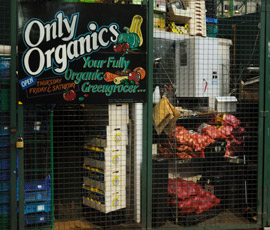Organic industry told to become less elitist

The organic industry has to become less elitist about supermarkets if it wants consumers to have access to good food, according to the Soil Association.
Finn Cottle, Soil Association trade consultant, said organics was a niche market, with sales worth about £1.6bn sales a year – £1.3bn of which were through supermarkets.
“Without them we would be a very niche market,” she told delegates at the Organic Research Centre annual conference in Birmingham on Wednesday (18 January).
“We need supermarket access, without it we would have a £300m market.”
Ms Cottle said while the organic market was declining, with sales slipping 6% in the year to November 2011, there were categories that were doing well, particularly in large retailers.
“It’s not all bad news. Red meat in particular has had a very good year in supermarkets,” she said during a breakout session on corporate organics and ethical principles.
“We are achieving growth even though the figures might suggest we are in decline.”
Many consumers who bought organic relied on supermarkets to source food which met the ethics and principles of organic production, she added.
“Of the 21m UK households [85% of total households] who bought an organic product last year, only 8% of them are core, committed organic shoppers.
“The majority of shoppers don’t fully understand organic what production is and expect businesses to do everything for them and deliver a product they know is fair and has integrity.
“We have to accept that organic consumers live in big cities and have to rely on big business to get what they want,” Ms Cottle said.
“Good food for all has to be available for all through larger operators and those are big businesses in the form of supermarkets. We cannot afford to be elitist about them.”
Andrew Burgess, director of agriculture at vegetable supply group Produce World, said working with big business did not mean the ethical principles behind organic had to be lost.
More than 35m people ate vegetables from Produce World in 2011, but being a big company and working with retailers had allowed it to invest in even better methods of production and environmental management, he said.
“The organic industry had to become more grown-up in its arguments if it’s going to retain consumers, particularly around organic versus conventional,” he added.
“There are good things going on in conventional farming and we can learn from each other.
